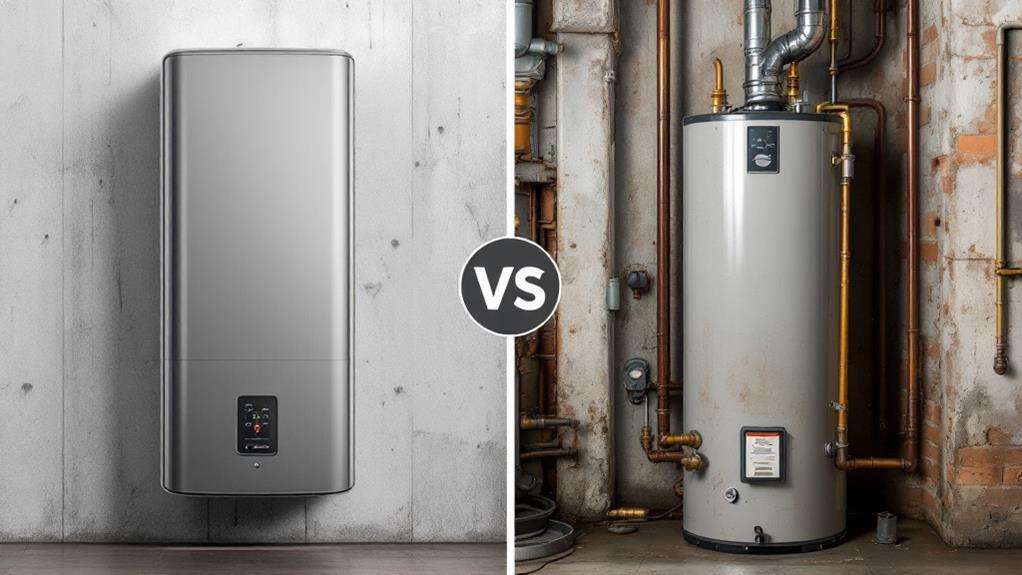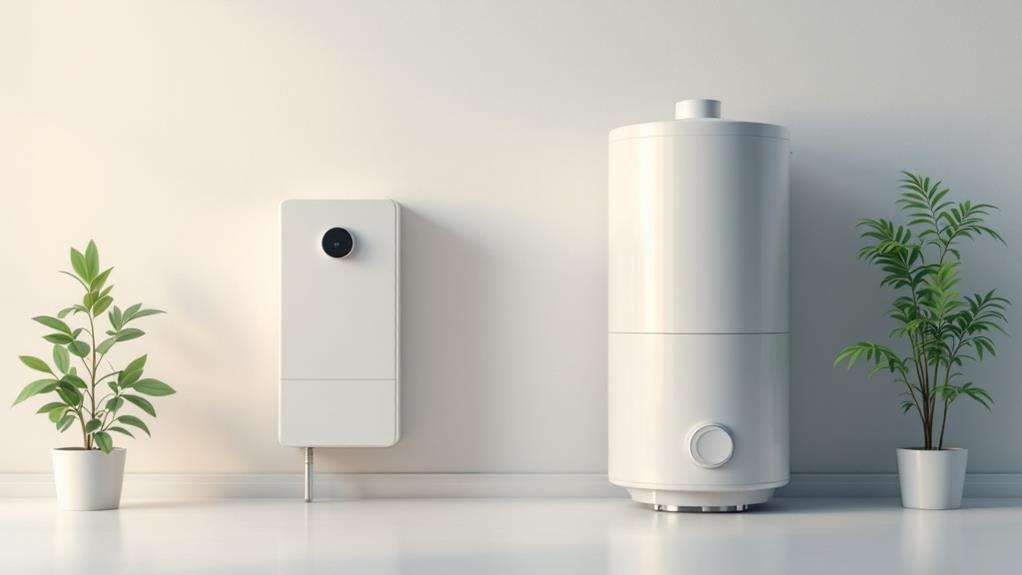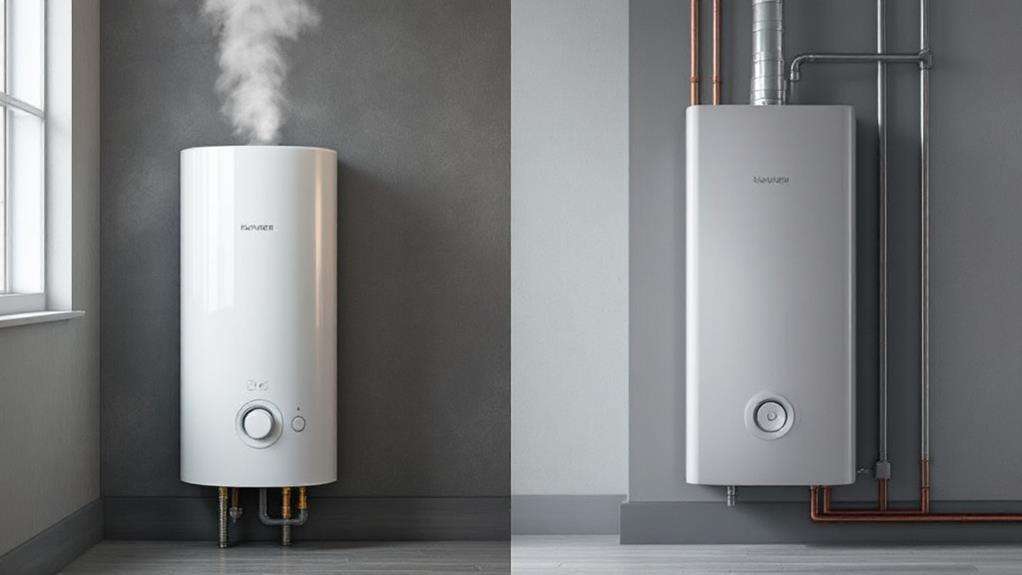Tankless vs. Traditional Water Heaters: Which Is Better?
As you weigh the options, tankless water heaters generally outshine traditional tank models in key areas. They're more energy-efficient, take up less space, and last longer with lower maintenance. You'll enjoy a continuous hot water supply without standby heat losses. While the upfront costs may be higher, tankless heaters deliver significant long-term savings on utility bills. Plus, they're quieter and can provide a more comfortable home environment. To really dive into the details on why tankless could be the better choice for your household, let's take a closer look.
Key Takeaways
- Tankless water heaters offer higher energy efficiency and lower operating costs, but have higher upfront installation costs compared to traditional tank-style heaters.
- Tank-style water heaters provide a consistent supply of hot water, making them more suitable for bathing, while tankless models offer an unlimited hot water supply.
- The choice between tankless and tank-style water heaters should be based on the household's specific hot water requirements, including the number of bathrooms, appliances, and peak demand.
- Tankless water heaters have a longer lifespan of up to 20 years, compared to 8-12 years for tank-style models, and require less maintenance.
- Both tankless and tank-style water heaters can be designed to be energy-efficient and sustainable, with tankless models offering a smaller carbon footprint due to their higher efficiency.
Comparison of Energy Efficiency
When it comes to energy efficiency, tankless water heaters often outshine their traditional counterparts. Unlike bulky storage tanks that continuously heat and reheat water, tankless systems only heat water on demand, reducing operating costs. This on-demand functionality means you'll only pay for the energy used when you actually need hot water, not for maintaining a full tank.
Performance metrics further highlight the efficiency of tankless heaters. They can achieve energy factor ratings (a measure of overall efficiency) of up to 0.98, compared to 0.67 for standard tank models. This translates to significant savings on your monthly utility bills. Additionally, tankless heaters are less susceptible to standby heat losses, which can account for up to 20% of a traditional system's energy usage. With their streamlined, space-saving design and on-demand heating, tankless water heaters emerge as the clear winner in the energy efficiency arena.
Space Considerations and Installation
The compact size of tankless water heaters offers significant advantages in terms of space considerations and installation. Compared to traditional tank models, tankless units have a much smaller footprint, freeing up valuable floor space in your home. This makes them an ideal choice for cramped utility rooms, closets, or other tight spaces where a bulky tank simply won't fit.
Venting considerations are also typically more straightforward with tankless heaters. They often require only a small vent pipe to the exterior, rather than the large flue needed for a tank-style unit. This streamlined venting not only saves space but can also simplify the installation process, potentially reducing costs. Additionally, tankless heaters can be mounted on walls, further minimizing their physical footprint.
Lifespan and Maintenance Requirements

Considering the lifespan and maintenance requirements, tankless water heaters generally outlast their traditional counterparts. These on-demand systems are designed to last up to 20 years, while storage tank heaters typically have a lifespan of 8-12 years. The repair complexity for tankless units is generally lower, as they have fewer moving parts. Whereas traditional heaters often require more frequent part replacements, tankless models only need occasional maintenance, such as flushing the system to remove mineral buildup. This translates to lower long-term ownership costs. Additionally, tankless heaters occupy less space, making them ideal for homes with limited utility room space. When it's time to replace your water heater, the higher upfront cost of a tankless system may be offset by its extended lifespan and reduced maintenance needs, making it a more cost-effective choice in the long run.
Hot Water Availability and Recovery
On-demand tankless water heaters excel in providing continuous hot water, unlike traditional storage tank models that have a finite supply. Without a storage tank, tankless heaters heat water only when you need it, ensuring a near-limitless flow. This is especially beneficial if you have a large household with multiple people showering back-to-back. Water pressure considerations are also important - tankless heaters maintain excellent water pressure, whereas storage tanks can experience reduced pressure as the tank empties.
Year-round temperature maintenance is another advantage of tankless systems. They instantly heat water to your desired temperature, so you won't have to worry about running out of hot water or dealing with tepid temps. This makes them ideal for colder climates where storage tanks may struggle to maintain hot water. Overall, the endless hot water and consistent temperature of tankless heaters make them a practical choice for many homeowners.
Environmental Impact and Sustainability

In addition to their practical advantages, tankless water heaters also offer notable environmental benefits that make them a sustainable choice for many homeowners. By eliminating the need for a large storage tank, tankless systems significantly reduce your carbon footprint by using less energy. Furthermore, they can be easily integrated with renewable energy sources, such as solar panels, making them an even greener option for your home.
Here are 4 key environmental advantages of tankless water heaters:
- Energy Efficiency: Tankless heaters only heat water on demand, avoiding the standby energy losses associated with traditional tank-style models.
- Reduced Greenhouse Gas Emissions: With their lower energy consumption, tankless heaters contribute to a smaller carbon footprint, helping to mitigate your household's impact on the environment.
- Compatibility with Renewable Energy: Tankless systems can seamlessly work with solar water heating or other renewable energy sources, further enhancing their sustainability.
- Extended Lifespan: Tankless heaters typically last longer than traditional models, reducing waste and the need for frequent replacements.
Cost Considerations and Affordability
While tankless water heaters often command a higher upfront cost compared to traditional tank-style models, their long-term cost savings can make them a worthwhile investment for many homeowners. Though the initial installation fees for tankless units may be steeper, they can save you money on your monthly operating costs. Tankless heaters are more energy-efficient, using only the exact amount of energy needed to heat water on-demand. This translates to lower energy bills over time. Additionally, tankless models have a longer lifespan, typically lasting 20 years or more, compared to the 10-15 years of a traditional tank. When factoring in the reduced energy consumption and extended usable life, the higher upfront cost of a tankless heater can often pay for itself in the long run. Consider your budget, expected hot water usage, and long-term ownership plans to determine if a tankless water heater is the more affordable choice for your home.
Noise Level and Comfort Factors

Tankless water heaters are typically quieter in operation compared to traditional tank models. You'll barely notice them running, allowing you to enjoy a more peaceful home environment. The sound quality is significantly improved, with only a subtle hum rather than the constant rumbling of a tank heater.
When it comes to comfort factors, tankless units excel in temperature stability. You'll never have to worry about running out of hot water or dealing with temperature fluctuations. The on-demand heating ensures a consistent flow of hot water, no matter how many taps are in use. This temperature stability enhances your overall bathing and washing experience, making it more enjoyable and comfortable.
Here are 4 key benefits of tankless water heaters regarding noise level and comfort factors:
- Quieter operation with minimal sound
- Consistent temperature delivery
- Uninterrupted hot water supply
- Enhanced comfort and relaxation
Suitability for Different Household Needs
When it comes to choosing between a tankless or traditional water heater, the needs of your household play a significant role. Tankless water heaters offer greater convenience of use, as they provide a continuous flow of hot water on demand. This means you'll never run out of hot water, even with multiple simultaneous uses. However, traditional water heaters may offer more temperature consistency, maintaining a stable water temperature throughout your home.
If your family has high hot water demands, such as large laundry loads or multiple showers back-to-back, a tankless system could be the better choice. Conversely, if you prioritize precisely controlled water temperatures for tasks like bathing, a traditional tank-style heater may be more suitable. Consider your household's unique hot water requirements to determine the best fit for your needs and ensure a comfortable, efficient hot water solution.
